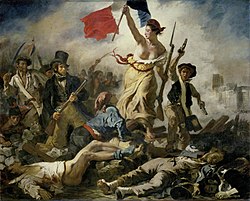
Back الثورة الإنجليزية Arabic Angol forradalom Hungarian 영국 혁명 Korean Revoluția Engleză Romanian Cách mạng Anh Vietnamese
This article needs additional citations for verification. (February 2023) |

| Part of a series on |
| Political revolution |
|---|
 |
|
|
The English Revolution is a term that describes two separate events in English history. Prior to the 20th century, it was generally applied to the 1688 Glorious Revolution, when James II was deposed and a constitutional monarchy established under William III and Mary II.[1]
However, Marxist historians began using it for the period covering the 1639-1651 Wars of the Three Kingdoms and the Interregnum that followed the Execution of Charles I in 1649, before the 1660 Stuart Restoration had returned Charles II to the throne.[2] Writing in 1892, Friedrich Engels described this period as "the Great Rebellion" and the Glorious Revolution of 1688 as "comparatively puny", although he claimed that both were part of the same revolutionary movement.[3]
Although Charles II was retroactively declared to have been the legal and rightful monarch since the death of his father in 1649, [4][5] which resulted in a return to the status quo in many areas, a number of gains made under the Commonwealth remained in law.[6][7]
- ^ Trevelyan 1938, p. ?.
- ^ Trotsky, Leon (1920). "4: Terrorism". Terrorism and Communism – via Marxists Internet Archive.
In the seventeenth century England carried out two revolutions. The first, which brought forth great social upheavals and wars, brought amongst other things the execution of King Charles I, while the second ended happily with the accession of a new dynasty. [...] The reason for this difference in estimates was explained by the French historian, Augustin Thierry. In the first English revolution, in the "Great Rebellion," the active force was the people; while in the second it was almost "silent." [...] But the great event in modern "bourgeois" history is, nonetheless, not the "Glorious Revolution," but the "Great Rebellion."
- ^ Engels, Friedrich (1892). "1892 English Edition Introduction". Socialism: Utopian and Scientific – via Marxists Internet Archive.
- ^ House of Commons 1802a.
- ^ Harris, Tim (2005). Restoration: Charles II and His Kingdoms, 1660–1685. London: Allen Lane. p. 47. ISBN 0-7139-9191-7.
- ^ O'Riordan, Christopher (1992). "Self-determination and the London Transport Workers in the Century of Revolution". Archived from the original on 26 October 2009.
- ^ O'Riordan, Christopher (1993). "Popular Exploitation of Enemy Estates in the English Revolution". History. 78 (253): 184–200. doi:10.1111/j.1468-229X.1993.tb01577.x. Archived from the original on 26 October 2009.
© MMXXIII Rich X Search. We shall prevail. All rights reserved. Rich X Search